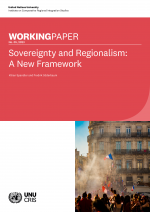Micro-Regionalism in Africa: Competing Region-Building in the Maputo Development Corridor
Regionalist processes are occurring all over the world, not least the formation of micro-regionswhich, although obviously not a new occurrence, are more and more cross-border in nature ratherthan being contained within the boundaries of a particular nation-state (the standard conception ofa micro-region).1 The African continent has not missed out on the growth in the number of suchmicro-regions which are currently reconfiguring the world (Breslin and Hook, 2002; Perkmannand Sum, 2002), but the problem is that such micro-regions have received rather muted attention.The neglect of micro-regionalism in the study of Africa is unfortunate, since it is perhaps theform of regionalism most beholden to “real” “African” processes on the ground but also reflectsin detail some of the processes occurring at higher levels or scales. Concrete studies of regionalinteractions on the continent are perhaps the most fruitful in lifting the veil of obscurity overmuch of what is “really” occurring and identifying the interface between elite-derived agendasand popular reactions to such processes. In dealing with micro-regionalism in Africa we placespecial emphasis on how local communities regard and respond to top-down and formalisedregional initiatives “on the ground”—and how such actors create their own initiatives...

